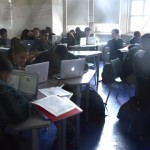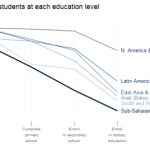 When we are living in an information era, it is impossible for setting boundary for flow of information. A student in Arbaminch University does not have to call nor even write email to his friend(s) at Maharishi University to inform them about his birth day event. All she/he has to do is to add an event in his/her Facebook page and that is all! Whoever is his/her friend will instantly be informed and can virtually be a participant in the event by virtue of the flexible and interactive comment and tagging utilities provided by Facebook.
When we are living in an information era, it is impossible for setting boundary for flow of information. A student in Arbaminch University does not have to call nor even write email to his friend(s) at Maharishi University to inform them about his birth day event. All she/he has to do is to add an event in his/her Facebook page and that is all! Whoever is his/her friend will instantly be informed and can virtually be a participant in the event by virtue of the flexible and interactive comment and tagging utilities provided by Facebook.
Facebook has become a daily talk everywhere among university students. It is hardly possible to get a college student who doesn’t know about Facebook.
Nonetheless, it is worth for me to give a brief introduction about it before getting to its impact on college student’s academic performance as a result of poor time management resulted from devoting a lot of time to Facebook.
Facebook is a social networking website introduced in February 2004 and is privately owned under the name of ‘Facebook Inc.’ It get its name From colloquial name for the book given to students at the start of the academic year by some university administrations in the United States to help students get to know each other. Facebook was initially founded by a group of college students, mainly Mark Zuckerberg and his college roommates from the computer science group including Eduardo Saverin, Dustin Muscovite and Chris Hughes. The only people who could use the website were the founders and other few students from the Harvard University. Later on the membership was expanded to other students from Lvy and Stanford universities. These all universities were located in Boston. In September 2005 Zuckerberg launched a high-school version of Facebook and this version needed an invitation from an existing user to join. Later Facebook offered invitation to employees of different companies like Microsoft and Apple. Finally on September 26, 2006 Facebook was opened to everyone to join freely with the age limit of being over 13 and having a valid email address. As of April, 2012, Facebook has more than 180 million active users and more than 50% of the active users log on to Facebook in any given day time.
On an average each active user has more than 130 friends added to their profile. There are more than 900 million interactive objects on Facebook including community pages, events, groups and fan pages etc. An average user is connected to around 80 group events and pages. Statistics tell that on an average the number of photographs uploaded on Facebook daily exceed 250 million. Facebook can be used in more than 70 languages. More than 75% of Facebook users are non Americans. More than 20 million apps are installed on Facebook every day and more than 500 million people use an application or experience Facebook’s platform on other websites.
The use of facebook these days has been widespread with great multitude of people ranging from individual for maintaining their profiles , social groups to promote their goals , by activists to circulate ideas and get more audiences and even by other famous web based applications. Although Facebook has been the celebrated, praised, elegant and the leading web based application enriched with lots of utilities and embedded apps, its relevance should not always be considered only from the point view of the service it provides.
It should also be seen from the point of view of how its users are using it in their daily life. Its use should be in such a way that it shouldn’t bring a counterproductive effect on the users precious time and resources. Among other users, students, academic and administrative personnel’s in universities are mainly considered to be vulnerable to the improper of Facebook.
Since Facebook is intended as a platform for engagement, and because students spend a significant amount of time using the site, it makes sense to study the relationship between Facebook use and student engagement. There has been several research conducted to find out potential problems in the misuse of facebook among students. Although I did not include a specific data in this article to show the magnitude of this problem for the case of Arbaminch University, it is evident from the general observation that the problem is widespread throughout the campus.
Apart from the time devoted for Facebook, the amount of physical and psychological energy that student would have devoted to the academic experience is partly exhausted on their exploration of the virtual world through Facebook. This has negative contribution to the academic outcome of students. Internet and network infrastructures are suppose to facilitate the teaching-learning process in the university. As internet is now is available almost everywhere inside the campus, so does Facebook. In some computer laboratories where almost all computers are having internet connection, most students surf and see “too many faces but not too many books”.
 In the university staff’s lounge (called ‘bedena’) students spend almost all the night surfing internet where Facebook is again, almost the only website one can see on their laptop screen wherein they engaged in activities like sharing links , checking to see what friends are up to, chatting, and other activities on the expense of their study time. In some occasions, these students even keep on using facebook during exam weeks. Nowadays, two days gap between two consecutive exams is long enough for student to dedicate one day for facebook. This sufficiently shows the strong attachment of students’ sprit and emotion to Facebook.Few years ago, having private laptops for students in universities like Arbaminch was very rare. However, nowadays, there have been a noticeable number of students with their own laptops. The wireless network set up at different places in the campuses by ICT office has been a meeting place for these students to use the free and unlimited internet access services. Surfing is not only limited to laptops. handheld device like mobile phones capable of connecting to wireless network are increasingly in use. This further increases the reachable users and spaces including classrooms and libraries. Though there are students who use this connection to surf relevant information pertaining to their study, the vast majority are facing faces than books!
In the university staff’s lounge (called ‘bedena’) students spend almost all the night surfing internet where Facebook is again, almost the only website one can see on their laptop screen wherein they engaged in activities like sharing links , checking to see what friends are up to, chatting, and other activities on the expense of their study time. In some occasions, these students even keep on using facebook during exam weeks. Nowadays, two days gap between two consecutive exams is long enough for student to dedicate one day for facebook. This sufficiently shows the strong attachment of students’ sprit and emotion to Facebook.Few years ago, having private laptops for students in universities like Arbaminch was very rare. However, nowadays, there have been a noticeable number of students with their own laptops. The wireless network set up at different places in the campuses by ICT office has been a meeting place for these students to use the free and unlimited internet access services. Surfing is not only limited to laptops. handheld device like mobile phones capable of connecting to wireless network are increasingly in use. This further increases the reachable users and spaces including classrooms and libraries. Though there are students who use this connection to surf relevant information pertaining to their study, the vast majority are facing faces than books!
The most crucial observation one can see on the very detail of the activity they do on Facebook is that students’ discussion do not focus on relevant things for studies. Facebook profile facility in particular allows a user to publish a message or sentence which summarizes his or her actions or state of mind. The participants, including students usually don’t published profile information about difficulties at school to transpire. This has a more adverse outcome on students who experienced fairly major setback in the university and those experiencing academic difficulties. This to some extent contributes some students to rely on others for their examination success through illegal collaboration during exams. I hope it will not be an exaggeration for me to assert that exam cheating are born through the indirect influence imposed by unplanned user of Facebook on students study time.
A similar failure in proper use of Facebook is also seen among academic and administrative personnel in the university. Instructors, secretaries, members of administrative staffs, including higher university authorities have also been among the concern of this problem.
The university ICT office has been trying to optimize the usage of bandwidth by limiting access to selected social network like Facebook and other chat apps for limited hours so that bandwidth is productively and fairly used for other websites which are worth to supplement resources needed to support students and Instructors. This limit set back the ICT office has been penetrated by Facebook addicted users through the use of software utilities like Freegate and Ultrasurf which allow them to bypass the blockage.
 Conclusively speaking, there is compelling evidence on the concern of facebook’s counterproductive impact on students and other community of the university due to improper usage of time, resources and most importantly the type of issues discussed on the pages.
Conclusively speaking, there is compelling evidence on the concern of facebook’s counterproductive impact on students and other community of the university due to improper usage of time, resources and most importantly the type of issues discussed on the pages.
Social network like facebook can be intelligently and productively exploited for a more useful purpose if we have proper personal and collective orientation towards its use. But the present scenario seems to be very much deviating from this type of usage. If the situation is allowed to continue the way it has been so far, we are allowing wastage of irreplaceable time of our students, rotten the most productive and creative mind of the young generation and abuse resources of our country which is striving on the road of development and development activities for which it is waiting a skilled indigenous young generation. Furthermore, letting this scenario not to follow the right way will make the situation to have a more destructive effect on high school and junior school students which are not very far from the issue I presented here. Hesitating from the concern of this problem will lead the situation to escalate more and we will have days to come to regret very much.
I am, in no way, intended to exaggerate the issue nor did I have any intention to offend Facebook users. Apparently, I am presenting the picture as we all see it. Although this specific article focused on cases in institute like Arbaminch university where I am serving as an assistant lecturer, similar observation is evident in most institutes, government offices and internet cafes all over the country.
In the context of Arbaminch University, there is an intolerable need from different bodies of the university to actively react to this situation. The realizations of goals and visions of the university in one or the other way are highly dependent on how we intelligently address issues like technology misuse.
The reaction to this problem can be in the form of conducting researches, panel discussions and symposiums, and analyze the detail issue of the problem. Following the research and discussions, the possible practical solution should be sought and the necessary support for its implementation needs to be provided by the university. Above all, understanding the seriousness of the problem and commitment to solve it from every single individual is crucial. All the researches and discussions are means but not goals. No matter how smart they are, research outcomes with no solution and implementations are just like ‘a crying fox’ and will be shelf decorator that will never help at the end of the day!
By Miftah Bedru Jamal, Lecturer, Department of computer science and IT. [email protected]
Sources:
International journal of multidisciplinary sciences and engineering, vol. 3, no. 4, April 2012 – Social Networking (Facebook): Wastage of Time or an Important Web Resource
Press article on the relationship between multiple indices of Facebook use and academic performance
General observation of AMU community
By Miftah Bedru Jamal, Lecturer





























Join Conversations